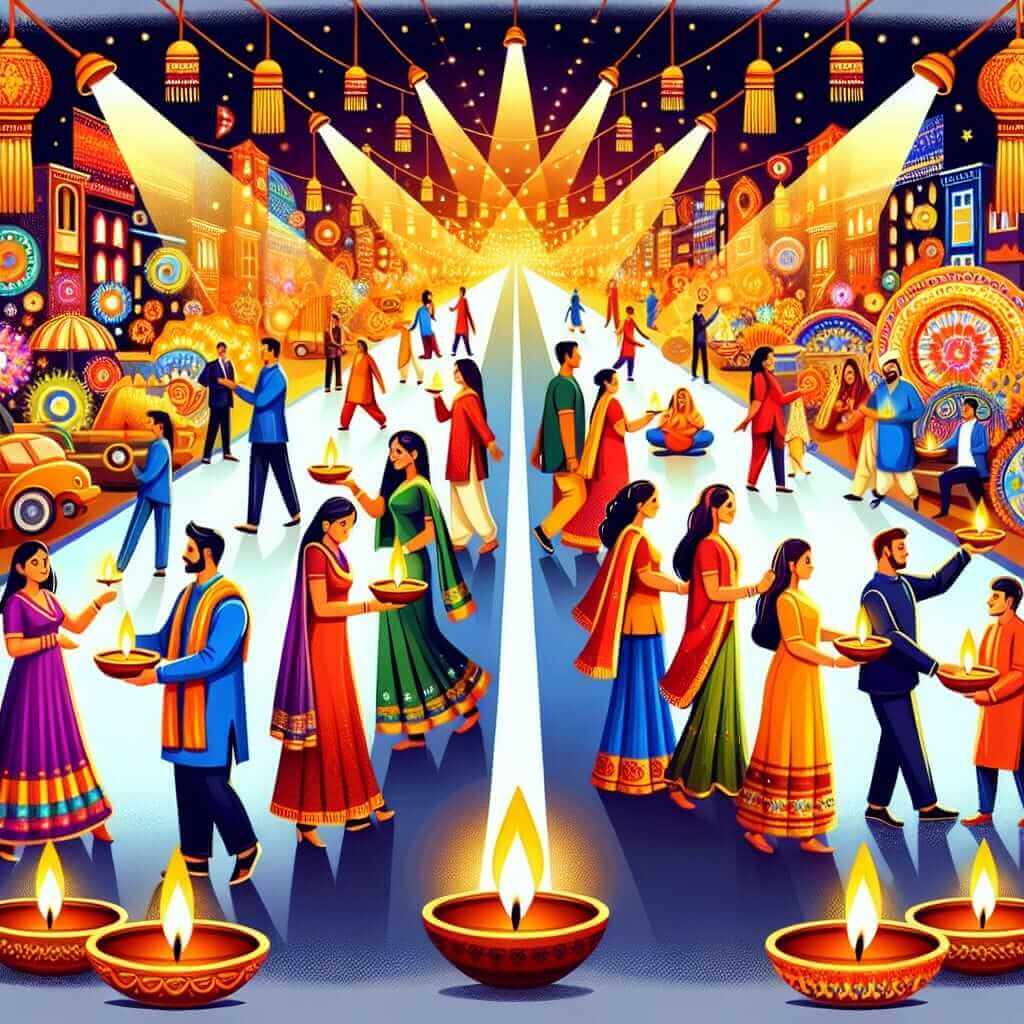The Reading section of the IELTS exam is designed to assess your ability to comprehend and interpret various texts of different complexities. Over the years, themes related to cultural festivals such as Diwali, one of the most significant festivals in India, have frequently appeared in the IELTS Reading module. Given the richness of this topic, it offers a profound understanding of history, culture, and traditions, which are essential areas for a well-rounded reading comprehension practice.
In this article, we will delve into the historical significance of Diwali in India, while providing a reading sample for you to practice, complete with questions and detailed explanations.
Diwali: The Festival of Lights
Diwali, or Deepavali, literally means “rows of lighted lamps” and is often referred to as the “Festival of Lights.” Celebrated by millions across India and the world, this festival symbolizes the victory of light over darkness, good over evil, and knowledge over ignorance.
Historical Background of Diwali
The celebrations of Diwali can be traced back to various historical and mythological events. Hindu mythology claims that the festival marks the return of Lord Rama to Ayodhya after 14 years of exile and his victory over the demon king Ravana. On his return, the people of Ayodhya lit oil lamps to welcome him, which is why lighting lamps has become a central part of Diwali celebrations.
Another significant legend is that of Lord Krishna’s triumph over the demon Narakasura, which is celebrated as Naraka Chaturdashi, a day before Diwali. In Jainism, Diwali marks the anniversary of Nirvana or liberation of Mahavira’s soul, while in Sikhism, it coincides with the release of Guru Hargobind Ji from imprisonment.
Reading Practice Test: Historical Significance of Diwali
IELTS Reading Passage
Diwali: A Festival of Historical and Cultural Importance
Diwali, known as the Festival of Lights, is one of the most prominent festivals celebrated in India. It signifies the victory of light over darkness and good over evil. The history of Diwali is intertwined with numerous myths and legends from different religious traditions in India.
Hindus celebrate Diwali to honor the return of Lord Rama, his wife Sita, and brother Lakshmana to Ayodhya after a 14-year exile. They believe that the people of Ayodhya illuminated the entire city with oil lamps (diyas) to celebrate their king’s return and the victory over the demon king Ravana. Therefore, lighting diyas is a central part of the Diwali festival.
Another legend associates Diwali with the story of Lord Krishna, who defeated the demon king Narakasura. This victory is celebrated as Naraka Chaturdashi, a day before Diwali. Additionally, it is said that on this day, the goddess Lakshmi emerged from the ocean of milk during the churning of the sea. Therefore, Lakshmi Puja, worshipping Goddess Lakshmi, is an integral practice during Diwali.
In Jain tradition, Diwali marks the enlightenment and liberation (Moksha) of their last Tirthankara, Lord Mahavira. For Sikhs, the festival commemorates the release of the sixth guru, Guru Hargobind Ji, and 52 other kings from the prison of Mughal emperor Jahangir.
Spanning five days, Diwali is celebrated by cleaning and decorating homes, exchanging gifts, feasting, and lighting fireworks. It fosters a sense of unity and joy as families come together to observe the rituals and traditions.
IELTS Reading Questions
Multiple Choice Questions
-
What is the primary significance of Diwali?
A. A celebration of autumn harvest
B. Victory of light over darkness
C. Lord Krishna’s birthday
D. The start of a new year -
Who is believed to have returned to Ayodhya after 14 years of exile?
A. Lord Krishna
B. Lord Mahavira
C. Guru Hargobind Ji
D. Lord Rama
True/False/Not Given
- Diwali is celebrated only by Hindus.
- The story of Narakasura is associated with Naraka Chaturdashi.
- Lighting diyas is only observed in Jain tradition.
Matching Information
Match the following statements with individuals related to Diwali’s history:
-
Gained liberation on Diwali —
-
Associated with Lakshmi Puja —
-
Released from Mughal imprisonment —
A. Guru Hargobind Ji
B. Goddess Lakshmi
C. Lord Mahavira
Answer Key and Explanation
- B – Diwali primarily signifies the victory of light over darkness.
- D – According to the passage, Lord Rama returned to Ayodhya after 14 years.
- False – Diwali is also celebrated by Jains and Sikhs.
- True – The passage clearly associates Narakasura’s defeat with Naraka Chaturdashi.
- False – Lighting diyas is primarily a Hindu tradition.
- C (Lord Mahavira) – Diwali marks the enlightenment of Lord Mahavira in Jain tradition.
- B (Goddess Lakshmi) – Lakshmi Puja is associated with the worship of Goddess Lakshmi.
- A (Guru Hargobind Ji) – The festival commemorates the release of Guru Hargobind Ji from imprisonment.
Common Mistakes and Tips
- Ensure reading each passage thoroughly to avoid missing crucial information.
- For True/False/Not Given questions, infer cautiously — if information isn’t directly stated, it’s likely “Not Given.”
Vocabulary
- Exile (n.) /ˈɛksʌɪl/ – The state of being barred from one’s native country.
- Liberation (n.) /lɪbəˈreɪʃ(ə)n/ – The act of setting someone free from imprisonment.
Grammar Point
Using Relative Clauses: Relative clauses, like “who defeated the demon king Narakasura”, offer essential information about the subject. They are integral for creating complex sentences and enhancing understanding.
Conclusion
Preparing for the IELTS Reading section requires a comprehensive understanding and strategic practice. Through articles like this, focusing on historically and culturally significant topics such as Diwali, you can build robust comprehension skills and improve your exam performance.
For further reading about cultural celebrations or the importance of preserving cultural heritage, visit our in-depth articles: Modern Adaptations of Traditional Chinese New Year Celebrations, The Importance of Preserving Cultural Heritage.

For aspiring IELTS candidates, consistency and practice are key to mastering the Reading section. Embrace diverse topics, enhance your vocabulary and grammar, and you will surely excel.